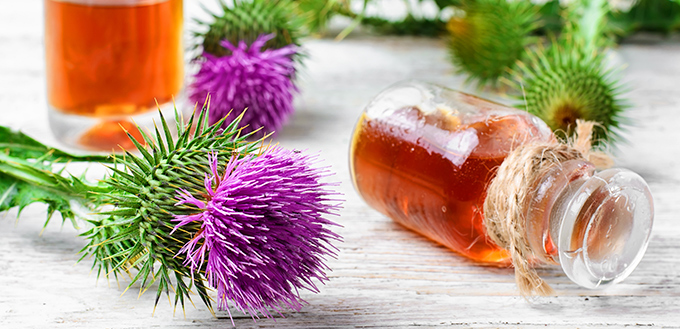I love a good herbal remedy. Call me an old hippie, but there is just something great about being able to lead a happy and healthy life using natural sources. My ultimate dream would be to grow my own home garden of healthy plants and herbs, but, unfortunately, I am not as good with plants as I am with animals. For some reason, everything I’ve tried to grow dies within a few weeks! My green-fingered failings aside, I still want to learn all about the herbs and plants that can help me and my pets. As part of this quest, I’ve already covered a few, like dandelions, and this week I’ve been researching the benefits of milk thistle.

What is the Milk Thistle?
The silybum marianum, or as it is more commonly known the milk thistle, Mary thistle, Scotch thistle or holy thistle, originated from the Mediterranean and is cousins with the common daisy and the ragweed. Its names come from its milky white sap and the white markings on its leaves, which were mythologized into representing the milk of the Virgin Mary.
With its purple flowers, spiky leaves, and tall stalk, you may recognize it as a national flower of Scotland, but it is worth noting that no one knows for certain which of the many thistle breeds is the official symbol for Scotland. It’s leaves can be eaten in salads as part of a normal diet, and its seeds can be roasted as a coffee substitute. The active ingredient in milk thistle is silymarin, made up of silychristine, silydianin and silybin, and it is theorized to help with a number of health issues in humans, predominantly:
- High cholesterol
- Diabetes
- Heartburn
- Enlarged Prostate
- Symptoms of Chemotherapy
- Infertility
- Cirrhosis
- Jaundice
- Gallbladder disorders
- Hepatitis
- Other liver problems
While studies have yet to pin point exactly how the milk thistle scientifically can benefit humans or animals, it has been used for over 2000 years for health improvement, and in the last decade people have begun to explore the potential benefits it can have for your pets.
The Benefits of Milk Thistle
- Helping dogs with liver disease
This is the greatest and most famous benefit of milk thistle. If your dog has some liver damage, milk thistle could help prevent additional damage and might even repaid their liver. Whether your dog’s liver is struggling due to over-medication, congested toxins, or one of the many other problems that can plague your dog’s liver, milk thistle’s antioxidant properties can help protect your dog from free radicals released by environmental toxins. Of particular note are allergic reactions, which may be increased in a weak liver as your dog’s body struggles to remove the histamines that combat allergens. By tuning up the liver, your dog’s allergies may start to reduce in severity.
- Helping dogs with kidney damage
Similarly, kidney damage due to infections, genes, or over-medication can be aided using the milk thistle. A number of studies have demonstrated that the administering of milk thistle to dogs has improved kidney function. While more studies may be need to pin point how exactly the herb is helping, the antioxidant properties that help the liver are likely to also be helping the kidneys.
Related Post: Best Dog Foods For Kidney Disease
- Protecting your dog’s pancreas
Another organ that can be helped using the milk thistle is the pancreas. Specifically, pancreatitis, an inflamed pancreas, can be alleviated. This may be due to free radicals and histamines again as histamines are often the cause of inflammation. Using antioxidants to allow histamines to be reabsorbed can also help the pancreas.
- Supporting your dog’s cancer treatment
Unfortunately, this is another area that is under-researched. However, many studies have shown that dogs suffering through cancer can have a better rate of improvement when taking milk thistle. Listen to your vet’s advice, and act cautiously. Milk thistle is not a cure for cancer.
- Supporting your diabetic dog
Some studies have shown that dogs struggling with diabetes can be helped using milk thistle. One dose per week may be enough to lower their required insulin intake. However, as this suggests that milk thistle interferes with their insulin production, you must talk to a vet before committing to the use of milk thistle.
Head over to our review of the Best Dog Food For Diabetic Dogs.

Giving Milk Thistle to Your Dog
It is very important to defer to your vet for advice when your dog has serious health concerns. Milk thistle’s use should be monitored by you and your vet, and is primarily just to alleviate stress placed on organs caused by toxins on the liver. While this can help your dog’s system to become more efficient, which can help in the fight against a disease like cancer, it is not a cure and it is not suggested that you consider permanent use. Do not give to pregnant or lactating pets.
When using milk thistle, an advisable dosage is:
- 2-5mg of powdered milk thistle for every 1 pound your dog weighs, twice a day, or
- 1/4 teaspoon of liquid milk thistle for every 20 pounds your dog weights, up to four times a day
If you choose not to use supplements and source your own milk thistle, make sure you are confident that you are harvesting the correct plant. Many thistles look alike, and it is easy to confuse the milk thistle with the blessed thistle. Pay attention to any side effects, particularly allergic reactions or gastrointestinal issues.
Other animals can have adverse reactions to the milk thistle. Specifically, the potassium nitrate is toxic to sheep and cows and may result in oxygen deprivation, but there may be other animals that react badly to the thistle. I can only recommend careful usage of the plant with dogs, please act cautiously and consult your vet if you are adding it to the diet of any other pets. Similarly, keep your supplements and any other potential dangers out of their reach.
Source:
- Cheryl Yuill, DVM, MSc, Milk Thistle or Silymarin, VCA Hospitals





